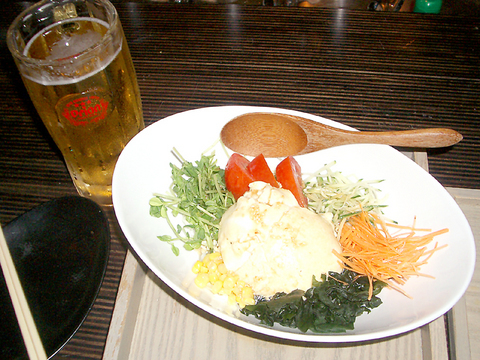Dozo is as good as any contemporary izakaya ("Japanese beer hall") in Tokyo. It is a great place for a meal or light snack and offers similar fare.
Before opening the restaurant in January, the owners spent time researching Japan's bars and eateries, and the decor wasn't the only thing they imported -- the chef was also brought over to ensure authenticity.
The restaurant's genuineness is proven by the number of Japanese patrons who frequent the establishment -- enough to warrant the staff learning Japanese.

PHOTO: DIANA FREUNDL, TAIPEI TIMES
The extensive menu includes all the traditional snack foods one would expect at an izakaya in addition to dishes like omogoieyyuo, often found only at specialty restaurants.
The only disappointment was the missing eda mame (boiled soya beans with salt), which is standard at most Japanese bars.
There are many grilled, deep fried and barbeque meat options as well as the popular sashimi, which can be ordered in small sizes or in assorted combos (NT$260 up to NT$980). The charcoal grilled beef with garlic sauce and the seafood and avocado salad are highly recommended by a few regular customers.
There is also a good selection of vegetable and tofu dishes to satisfy vegetarian and vegan restrictions. The tofu and seaweed salad is made with fresh, soft tofu and served over a bed of greens and savory homemade sesame dressing. It's too good to share.
The okonomiyaki (potato or rice-based pancake) filled with cabbage, carrots, onion and its namesake cream sauce is as tasty as those made in Hiroshima.
The portions are surprisingly large given the reasonable prices. A tofu salad, soba noodles and okonomiyaki was more than enough for two people and under NT$500, leaving extra money for drinks.
There is a separate beverage menu with a range of cocktail concoctions made with green tea or fresh fruit. Economically, beer is the better option with choice of bottled Asahi or pints of Orion draft. A word to the wise: the samurai -- a lethal cocktail -- packs a punch and may make you want to commit ritual suicide the next day.
Operated by the same group that owns TU and Brown Sugar, Dozo's lively atmosphere is more like a trendy Taipei lounge bar than a restaurant.

On April 26, The Lancet published a letter from two doctors at Taichung-based China Medical University Hospital (CMUH) warning that “Taiwan’s Health Care System is on the Brink of Collapse.” The authors said that “Years of policy inaction and mismanagement of resources have led to the National Health Insurance system operating under unsustainable conditions.” The pushback was immediate. Errors in the paper were quickly identified and publicized, to discredit the authors (the hospital apologized). CNA reported that CMUH said the letter described Taiwan in 2021 as having 62 nurses per 10,000 people, when the correct number was 78 nurses per 10,000

As we live longer, our risk of cognitive impairment is increasing. How can we delay the onset of symptoms? Do we have to give up every indulgence or can small changes make a difference? We asked neurologists for tips on how to keep our brains healthy for life. TAKE CARE OF YOUR HEALTH “All of the sensible things that apply to bodily health apply to brain health,” says Suzanne O’Sullivan, a consultant in neurology at the National Hospital for Neurology and Neurosurgery in London, and the author of The Age of Diagnosis. “When you’re 20, you can get away with absolute

May 5 to May 11 What started out as friction between Taiwanese students at Taichung First High School and a Japanese head cook escalated dramatically over the first two weeks of May 1927. It began on April 30 when the cook’s wife knew that lotus starch used in that night’s dinner had rat feces in it, but failed to inform staff until the meal was already prepared. The students believed that her silence was intentional, and filed a complaint. The school’s Japanese administrators sided with the cook’s family, dismissing the students as troublemakers and clamping down on their freedoms — with

As Donald Trump’s executive order in March led to the shuttering of Voice of America (VOA) — the global broadcaster whose roots date back to the fight against Nazi propaganda — he quickly attracted support from figures not used to aligning themselves with any US administration. Trump had ordered the US Agency for Global Media, the federal agency that funds VOA and other groups promoting independent journalism overseas, to be “eliminated to the maximum extent consistent with applicable law.” The decision suddenly halted programming in 49 languages to more than 425 million people. In Moscow, Margarita Simonyan, the hardline editor-in-chief of the